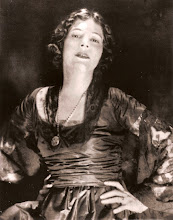 Born in Portland, Oregon (nee Ann Ditchburn), the daughter of a Protestant minister, Ann honed her vocal skills in the church choir. Adopting the stage name of Swinburne (who she claimed was a distant relative), Ann lost no time in heading east, to New York, where she became the darling of the Light Opera stage, starring in "The Madcap Duchess" and the "Count of Luxemburg" on Broadway and in national tours.
Born in Portland, Oregon (nee Ann Ditchburn), the daughter of a Protestant minister, Ann honed her vocal skills in the church choir. Adopting the stage name of Swinburne (who she claimed was a distant relative), Ann lost no time in heading east, to New York, where she became the darling of the Light Opera stage, starring in "The Madcap Duchess" and the "Count of Luxemburg" on Broadway and in national tours.
Blessed with charm, looks and an enchanted voice, Ann's star rose swiftly, and she rode it as far as it would take her.
She harbored dreams of an operatic career, but her debut in that arena was met with less than stellar accolades. Sensing that her exit cue was upon her, Ann retired into a good marriage and a brilliant career on the social stage.
Ever the actress, Ann played both the dramas and the comedies in her life with wit and grace. She was applauded for her lifetime epic by all who had the fortune (or the misfortune) to witness the thrilling twists and turns of her journey. She played her roles of wife (Rudolph E. Schirmer, J. Philip Benkard and lastly, Charles Munroe) widow and mother (Rudolph Edward Schirmer and Philip Benkard) with great passion, if not for her fellow players, then for the exhilarating emotions such plots could provide.
Loathed by those who were arrogant enough to outshine her, Anne perfected the art of obtaining undying devotion by her husbands and her closest friends. Ironically, for a woman so well-versed in classical and modern methods of sentiment, it would be safe to say that the real love of her life did not lie in any of the persons related to her. Love, rather, was to be found in the mere act of playing the emotional script of her life, which, not unlike the dramas she enacted, contained three very distinct acts, each one beginning as a brilliant romantic coup and ending in widow's weeds.
Having forged her social career by blurring the borders between fiction and life, not even Ann was sure where the salon ended and the stage began. Thus, Ann's greatest work of art was herself, chiselled and sculpted into her dowager years by a disciplined path of work, ego and will. In her, the old guard had found a new and improved, albeit a good deal more theatrical version of itself (one would be hard-pressed to say that they weren't the better for it). In return, they cast this rising star in the longest-running show ever to play on or off Broadway.
To this, we can only shout, "Bravo!"
At The Close
When the curtain came down,
and the bouquet was tossed,
and her monologues read
(some were salvaged,
...most were lost)
The maestro kissed her memory
The fans did dab their tears
The stagehand spoke a eulogy,
"She was best in "The Young Balladeers."
Thus notices crumbled into yesterday's dust
And charity socials she considered a must
had all blown by the wayside
so long, Upper Crust!
Ashes were scattered from luxury yachts
A series of rituals, "shoulds" and "oughts"
The chauffeur in mourning all morning said he
Les dames de toilette, Helene and Marie
illumined their votives and prayed for her soul
Who could be found to step into her role?
Cook swore she heard a low voice after tea,
"Why weren't the canapes laid out for three?"
And Madame's blue ball gown, all satiny lace,
was felt in the corridor, brushing her face,
"Tis hard to abandon this earthly show
When it's all that you love and desire and know
And worse to imagine them filling your shoes
with amateur ingenues missing their cues
And what I would give for another third act,
oh for more kindness, more patience, more tact.
If only I'd known the rewards to be had,
If only I'd taken more time for the lad,
If only I'd written,
If only I'd read,
If only I'd gotten up early from bed,
I might have been Helen,
I might have been Queen,
If only you'd let me - just one little scene!"
Then quickly, she vanished,
And so did her Age,
Snatched from the earth,
barred from the stage.
Her heirs have no interest
in subtlety's style,
nor in wit, nor in wisdom,
nor womanly guile...
Thus Madame's performances
fade from our view
and only her scrapbook
tells what is true,
that once a fine actress
did play in our midst...
"Her daring and passion
will surely be missed."
LS 2009





No comments:
Post a Comment